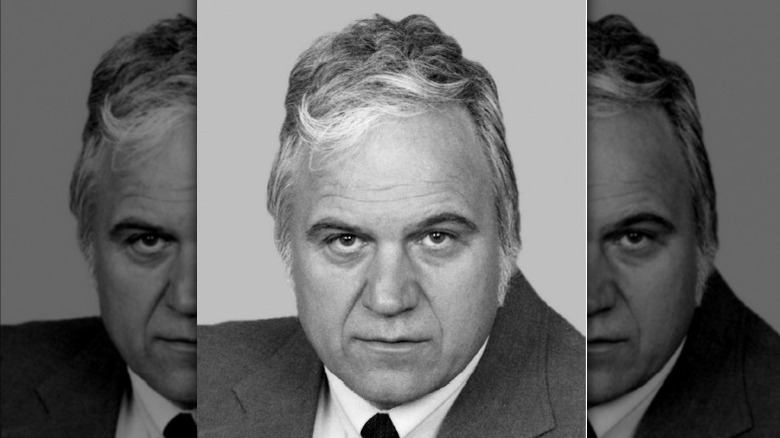The Maverick US Congressman Who Represented Himself And Beat A RICO Charge In Federal Court
Some people live lives that feel more like fiction than reality. One such person was James A. Traficant Jr., a U.S. congressman with a colorful vocabulary, a fake pompadour, and a propensity for defending himself in federal court. According to his Washington Post obituary, Traficant was born in Youngstown, Ohio in 1941. As a young man, he played football at the University of Pittsburgh before returning to his hometown and launching a career as a drug counselor. In 1980, he was elected as sheriff of Ohio's Mahoning County, according to The New York Times.
As sheriff, he first gained his reputation for favoring the little guy. When a court order mandated that he foreclose on the homes of mill workers who had lost their jobs, he refused, according to The Washington Post. He was sentenced to 100 days in jail for failing to sign the deeds against court orders but was released after three days when he relented, The New York Times reported at the time. However, he wasn't done fighting yet. According to UPI, he backed some of the original homeowners in bidding $1 and $1.05 in silver 50-cent pieces. His argument? Article I, Section 10 of the Constitution, which asserts that "no state shall ... make anything but gold and silver coin a tender in payment of debts."
U.S. v. Traficant
It was also as sheriff that James A. Traficant Jr. first got into legal trouble of a more serious nature. On August 9, 1982, he was indicted under the Racketeer Influenced and Corrupt Organizations (RICO) Act for accepting $163,000 in bribes from members of organized crime organizations during his election campaign, according to a copy of the case. The FBI had acquired tapes of a conversation between Traficant and criminal brothers Charles and Orland Carrabia in which Traficant mentioned receiving money from both the Carrabias and rival gangsters James Prato and Joseph Naples Jr.
Traficant did not have any legal education, according to The Washington Post. Despite this, he represented himself during the case. One of the jurors selected for the trial recalled that Traficant claimed not to be able to pay for a lawyer, according to the Tribune Chronicle. Traficant's argument was that he had only taken the money to later turn around and catch the criminals in the act of bribing him, according to The New York Times. The juror recalled in the Tribune Chronicle that Traficant offered a colorful defense. Notably, the juror remembered being asked by the judge whether he was comfortable with profanity. That comfort was put to the test during Traficant's opening remarks, when he declared (per the Tribune Chronicle), "I f***** the mob." In the end, the jury voted to acquit him. "I don't think that any of the prosecutors took Traficant seriously until it may have been too late," the juror said.
Rise and fall
James A. Traficant Jr. became locally famous after his successful self-defense, according to The New York Times. His brush with the feds certainly didn't harm his career, as he was elected to represent Ohio in Congress in 1984. He went on to win reelection eight times in a row, serving until 2002, according to Ohio History Central. Ostensibly a Democrat, he would often ignore this and vote with the Republicans. He became famous for advocating for the U.S. working class. For example, he opposed free-trade agreements and wanted more things made in the U.S., according to The New York Times.
Traficant was also eccentric in both dress and speech. According to The Washington Post, he liked to dress in cowboy boots and polyester suits. He also styled his hair in a bouffant that Washingtonian magazine (per The Washington Post) once described as "a creature from Lake Erie before it was cleaned up." In Congress, he would often finish speeches by saying (via Ohio History Central), "Beam me up, Mr. Speaker."
Traficant's fall began the same way as his rise: with corruption charges. This time, he was charged with crimes including taking bribes and forcing employees to work on his farm and give him part of their paychecks, according to CNN. During his 2002 trial, he once again defended himself and claimed the federal government was trying to get back at him for his 1983 win. "I'm going to look them right in the eye and go at them," he said.
U.S. vs. Traficant 2.0
James A. Traficant Jr.'s second attempt at self-defense was not as successful as his first. A jury convicted him on all counts in April 2002, as CNN reported at the time. "I accept your verdict," he said with his head down. This wasn't the only defeat he would face. On July 24, 2002, the House of Representatives voted to expel him from the body, according to United States v. Traficant. He therefore had the dubious honor of being the second person kicked out of the House for unethical conduct since the U.S. Civil War, according to The New York Times. He was sentenced to eight years in jail but only served seven. His arrest also revealed his famous hairdo to be fake when he was forced to remove it while being booked.
Traficant was released in 2009 and, undaunted, tried to run for Congress again. However, he lost to his successor Tim Ryan. He died in 2014 at the age of 73 in a tractor accident, Cleveland.com reported. The vehicle tipped over inside a barn, trapping him beneath it, where he was found unconscious. Despite the ups and downs of his life, he was remembered fondly even by rivals, like his prosecutor Craig Morford. "He was one of those people who had great strengths and great shortcomings," Morford said (via Cleveland.com). "His shortcomings caused him to make some very big mistakes. He was a gifted man in many ways. He had tremendous charismatic appeal."



